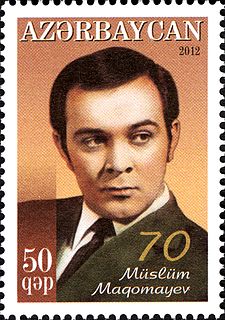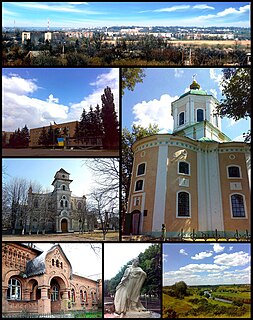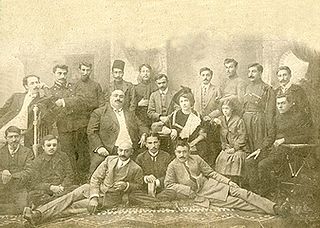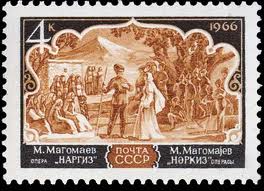
Muslim Magometovich Magomayev, dubbed the "King of Songs" and the "Soviet Sinatra" was a Soviet Azerbajiani baritone operatic pop singer. He achieved iconic status in Russia and the post-Soviet countries for his vocal talent and charisma.

Novomyrhorod is a city in Kirovohrad Oblast (region) of central Ukraine, in the southern part of the Middle Dnieper area. It is the administrative center of Novomyrhorod Raion. Its population is approximately 11,247 (2017 est.).

Zmiiv is a city in Kharkiv Oblast (province) of Ukraine. Zmiiv is the administrative center of Zmiiv Raion.
Haivoron is a town in Kirovohrad Oblast (region) of Ukraine. It serves as the administrative center of Haivoron Raion.

Mirza Agha Aliyev was an Azerbaijani actor. People's Artist of USSR (1949). The winner of two Stalin Prize of the second degree.

Polad Bülbüloğlu is a Soviet and Azerbaijani singer, actor, politician, and diplomat. Bülbüloğlu became famous in the Soviet Union with composing jazz-influenced pop songs which has heavy Azeri folk feelings in Russian and Azerbaijani languages. He also sang his own songs. Three of his songs became Songs of the Year and he received numerous prestigious awards in the Soviet Union. Bülbüloğlu is a lyrical tenor.
Uzundara or Ouzoundara — is a lyrical Azerbaijani dance performed by women. The song originates in a valley between Agdam and Prishib village in Karabakh area by the name of "Uzun dara", which means Long valley in Azeri. The dance is especially popular among the Azerbaijanis.

The Ministry of Communications of the Union of Soviet Socialist Republics (USSR) was the central state administration body on communications in the Soviet Union from 1946 to 1991. It had authority over the postal, telegraph and telephone communications as well as public radio, technical means of radio and television broadcasting, and the distribution of periodicals in the country.

Shah Abbas and Khurshid Banu – is the fourth mugham opera of Azerbaijani composer Uzeyir Hajibeyov in four acts and six scenes. A libretto also belongs to Uzeyir Hajibeyov. The opera was written basing on the motifs of Azerbaijani folk legend. The opera finishes with happy end, heroine – is a modest girl, daughter of a woodcutter who gains victory over psychology of a formidable Shah, who learns a handicraft – carpet weaving – because of his love to her.

Azerbaijani theatre – is a theatrical art of the Azerbaijani people.

“Shah Ismayil” – is an Azerbaijani mugham opera in 6 acts and 7 scenes composed by Muslim Magomayev, in 1915-1919. Libretto and text were written by Mirza Gadir Ismayilzade basing on a legend about young Shah Ismayil.

Maiden Tower is the first Azerbaijani ballet and the first ballet in the Muslim East. It consists of three acts with a prologue and epilogue. Afrasiyab Badalbeyli is the author of the music and libretto.
Topal Teymur – is a play, historic drama in five acts written by Huseyn Javid, Azerbaijani poet and playwright, in 1925. The play is about Timur, Central Asian conqueror. For the first time the play was staged, in 1926, in Baku.

Opera in Azerbaijan has a history dating back to the 19th century Russian Empire.

Ashig Garib – is the first opera written by Azerbaijani composer Zulfugar Hajibeyov, in 1916, based on motifs of a dastan of the same name. The opera was staged in Baku, in the theater of Haji Zeynalabdin Taghiyev, for the first time.

Ivanovism, also known by the name of the followers, the Ivanovites (Ивановцы), is a religious movement in Russia based on the teachings of the mystic Porfiry Ivanov and his "natural healing system". The movement is classified as syncretic. Central to the movement is the Detka (Детка) healing system and a "Hymn to Life" focused on religious ideas.
Utyz Imyani, Gabdrakhim — was a tatar poet. In the Islamic world is also known as a scientist, recover lost fragments of ancient Quran.
















